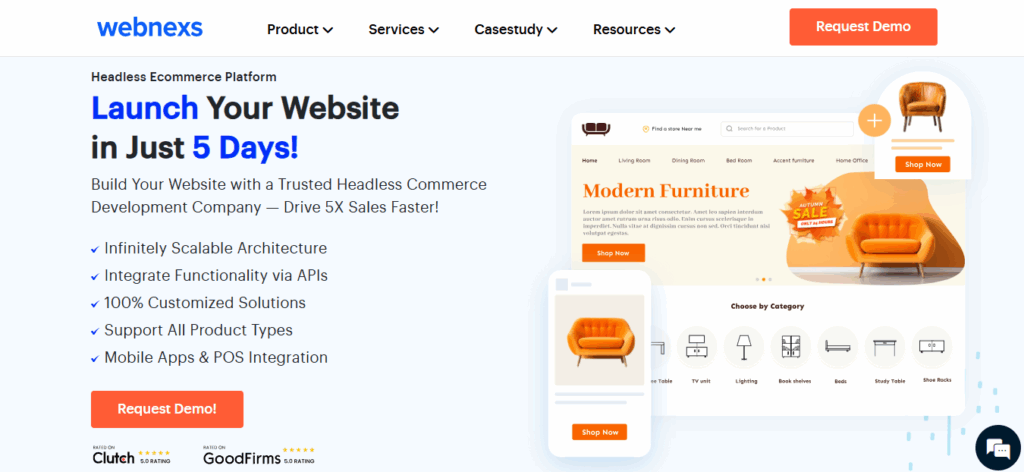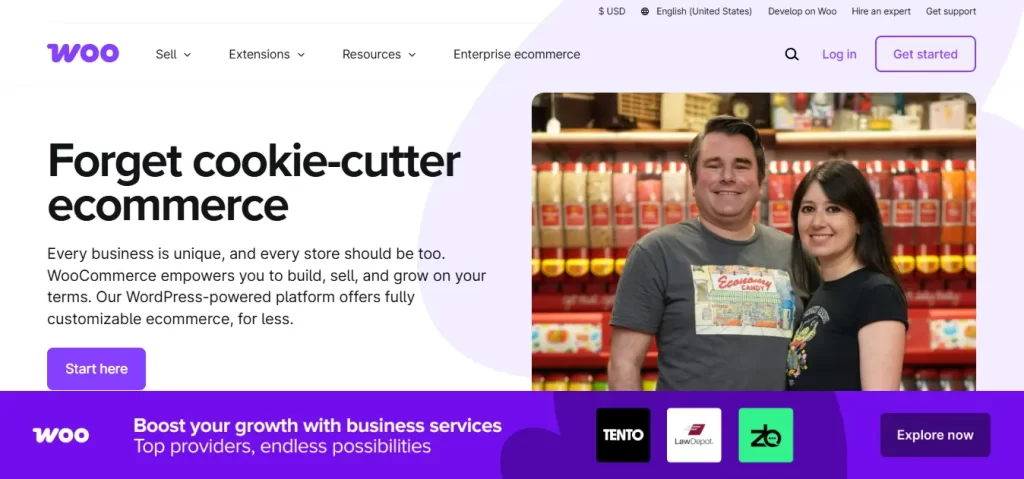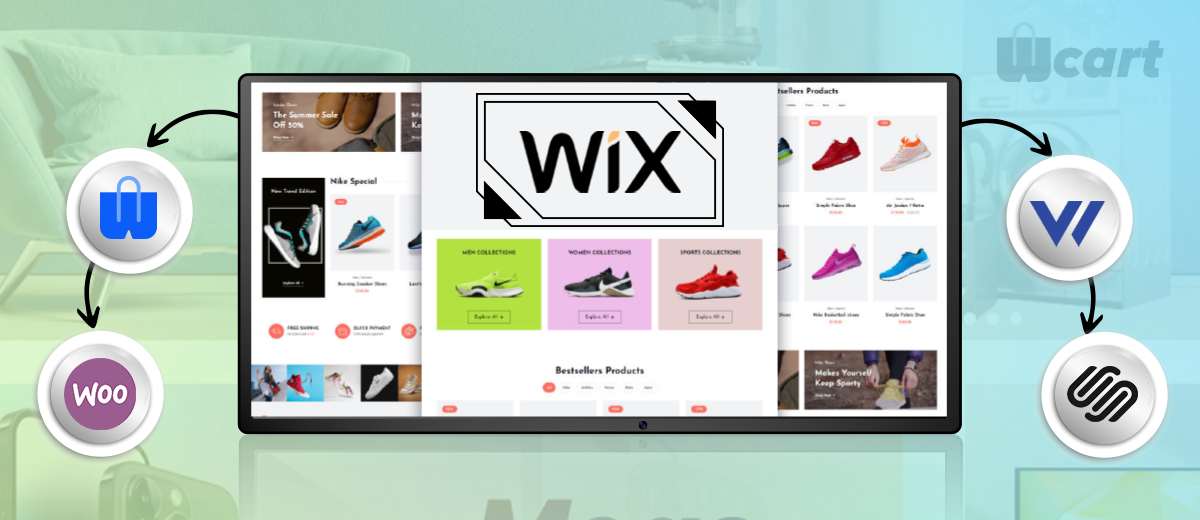After helping thousands of businesses migrate from general website builders to best platforms like Wcart.
We have found that Wix hurts businesses with slow loading product pages(average 4.2 seconds vs. industry standard 2.1 seconds), limited payment gateway options that abandon 68% of international customers, and inflexible checkout processes that cause 35% cart abandonment.
These are the main limitations that lead the businesses to seek for new alternatives. Our data shows that after switching to Wcart, these small businesses saw 3x higher conversion rates, 40% faster page loading speeds, and 58% reduction in cart abandonment.
5 Best Alternatives to Wix
1. Wcart – Easy to use and highly customizable
2. Webnexs – Ideal for enterprise-level businesses
3. Shopify – Best for small businesses
4. Magento – Best open-source ecommerce platform
5. WooCommerce -Designed for WordPress websites
Our analysis is based on real performance data from users who have switched platforms. We’ve included real case studies, use cases, and migration tips.
After more than 40 hours of research, we’ve organized this information to help you find the best alternative to Wix.
Why did we rank Wcart as #1? Because it’s not just our platform — many real businesses are earning millions using Wcart, thanks to its scalability, ease of use, and powerful conversion-boosting features.
Comparison of Wix and other website builders
Let’s see the comparison of Wix with top website builders.
Pros and cons of Wix
Pros of Wix:
- Its drag-and-drop interface makes it easy for users to create a website without any coding experience.
- Offers a large selection of templates to choose from, allowing users to create a unique and visually appealing website.
- Wix’s app marketplace presents a variety of third-party apps that website owners can integrate into their sites, including social media tools and e-commerce features.
- Offers a range of pricing plans, including a free option, making it accessible to users on a budget.
- Provides reliable hosting for websites, ensuring that they load quickly and stay online.
Cons of Wix:
- While Wix’s templates are visually appealing, they can be limiting in terms of customization, particularly for more advanced users.
- Offers e-commerce tools, but they may not meet the advanced requirements of larger online stores or businesses with complex needs.
- The free plan includes ads on the website, which can be distracting and unprofessional.
- It does not allow users to access or modify the website code, which can be frustrating for more advanced users who want more control over their website’s functionality.
- Moving a website from Wix to another platform can be difficult, as Wix does not allow users to easily export their website’s design and content.
Which are the Top Wix Alternatives For Ecommerce Stores In 2025?
We have listed out the best 5 platforms for alternatives to Wix, Let’s see one by one each platform’s features, pros, and cons.
1. Wcart

A. Overview and features of Wcart
Overview of Wcart: Wcart is a cloud-based ecommerce platform that allows businesses to create and manage online stores easily. It is a Wix alternative that offers more flexibility and customization options for businesses. Wcart provides a user-friendly interface that allows users to design and launch their online store quickly.
Features of Wcart: Wcart’s key features include a drag-and-drop website builder, customizable checkout pages, and multi-currency support. The platform also offers various payment gateway integrations, including PayPal, Stripe, and Square. Wcart allows businesses to sell physical and digital products, as well as services and subscriptions. Wcart also offers a free trial for businesses to test out the platform before committing to a pricing plan.
B. Pros and cons of Wcart
PROS:
- Customization options: Offers more customization options than Wix which allows businesses to create a unique and personalized online store.
- Lower transaction fees: Charges lower transaction fees than Wix, which can save businesses money on every sale.
- User-friendly interface: It has a user-friendly interface that makes it easy to design and launch an online store quickly.
- Affordable pricing plans: Offers a range of pricing plans to suit businesses of different sizes and budgets.
- Multi-currency support: Supports multiple currencies, which is helpful for businesses that sell internationally.
Cons
- Limited app store: Wcart’s app store is not as extensive as Wix’s, which could limit a business’s ability to add new features or functionality. This isn’t a problem to launch your store with them as the apps are ready already.
- Limited third-party integrations: It does not have as many third-party integrations as Wix, which could limit a business’s ability to integrate with other tools and services. But this wouldn’t inhibit someone from launching services towards ecommerce operations.
Overall, Wcart is a viable option for businesses looking for a Wix alternative that offers more customization and flexibility. With its user-friendly interface and affordable pricing plans, Wcart is worth considering for businesses of all sizes.
Visit Here: Start Your Business with Wcart
2. Webnexs

A. Overview and features of Webnexs
Overview of Webnexs: Webnexs is an ecommerce platform that offers a range of tools and features to help businesses create and manage their online stores. With Webnexs, businesses can design their own storefronts, manage products and inventory, process payments, and track sales and customer data. The platform also offers a range of marketing and SEO tools to help businesses drive traffic and increase sales.
Features of Webnexs: One of the unique features of Webnexs is its drag-and-drop storefront builder, which allows businesses to design their own storefronts without any coding knowledge. The platform also offers a range of templates and themes to help businesses get started quickly.
Overall, Webnexs offers a range of tools to help businesses drive traffic and increase sales, including email marketing, social media integration, and SEO optimization.
B. Pros and cons of Webnexs
Pros:
- User-friendly interface: This offers a user-friendly interface that is easy to navigate, making it easy for businesses to set up and manage their online stores.
- Comprehensive feature set: Range of features to help businesses create and manage their online stores, including product management, payment processing, marketing tools, and analytics.
- Multi-channel selling: Allows businesses to sell on multiple channels, including marketplaces and social media platforms, which can help increase their reach and sales.
- Responsive design: Offers responsive design templates that are optimized for mobile devices, ensuring that businesses can reach customers on any device.
Cons:
- Limited customization options: While Webnexs offers a range of design templates, customization options are limited but they can be extended on demand, which may make it difficult for businesses to create a unique brand identity immediately. However, designs can be implemented on demand.
- Pricing: Webnexs’ pricing may be slightly pricier than that of other platforms, as they offer a one-time payment solution, but it has many additional unique features that will help your business succeed and increase ROI.
Overall, Webnexs is a powerful ecommerce platform that offers a range of features and tools to help businesses create and manage their online stores.
Click Here: Start Your Business with Webnexs
3. Shopify

A. Overview and features of Shopify
Overview of Shopify: Shopify is an all-in-one e-commerce platform that allows users to create and manage their online store. The platform offers customizable templates and themes, a built-in payment gateway, shipping tools, and marketing and sales features. Shopify is known for its ease of use and user-friendly interface, making it a popular choice for businesses of all sizes.
Features of Shopify: Shopify offers a range of features and tools to help businesses sell their products online. Some of these features include customizable templates and themes, a built-in payment gateway that allows users to accept payments from various methods, shipping tools such as real-time shipping rates and label printing, and marketing and sales features including built-in SEO tools and integrations with social media platforms like Facebook and Instagram. Shopify also offers inventory management tools, order tracking, and customer profiles to help businesses manage their online store.
B. Pros and cons of Shopify
Pros:
- Ease of use: Shopify is known for its user-friendly interface and ease of use, making it accessible to businesses of all sizes and technical skill levels.
- E-commerce features: Offers a range of e-commerce features, including a built-in payment gateway, shipping tools, and inventory management, making it a comprehensive platform for online businesses.
- Customizable templates: A range of customizable templates and themes, allow businesses to create a professional-looking website that matches their branding and style.
- Marketing and sales tools: It has a range of built-in marketing and sales tools, including SEO tools, social media integrations, and email marketing, helping businesses increase their online visibility and sales.
- App integrations: Range of third-party app integrations, allowing businesses to add additional functionality to their online store.
Cons:
- Cost: More expensive than other website builders, especially for businesses just starting out.
- Limited design customization: While Shopify offers customizable templates, users may find the design customization options limited compared to other website builders.
- Transaction fees: It charges transaction fees for using third-party payment gateways, which can add up for businesses with high sales volumes.
- The learning curve for advanced features: While Shopify is easy to use for basic functions, some of the more advanced features may have a steeper learning curve for less technical users.
- Limited blog functionality: Its blog functionality is limited compared to other website builders, making it less ideal for businesses that want to prioritize content marketing.
Read More: To Know about Shopify Alternatives
4. Magento

A. Overview and features of Magento
Overview of Magento: Magento is a widely used open-source ecommerce platform that provides businesses with a range of tools and features to create and manage their online stores. It was first released in 2008 and has since become one of the most popular ecommerce platforms on the market, with a large community of developers and users contributing to its ongoing development.
Features of Magento: Magento offers a range of features, including product and catalog management, customer segmentation, order management, and marketing tools. It also has a robust set of APIs and integrations with third-party services, making it a flexible and scalable solution for businesses of all sizes.
B. Pros and cons of Magento
Pros:
- Scalability: A highly scalable platform that can grow with your business. It can handle large numbers of products, customers, and orders without sacrificing performance.
- Customization: Offers a wide range of customization options, from design templates to third-party extensions. This allows businesses to create unique and personalized online stores that align with their branding and business needs.
- Open-source: Magento is open-source software, which means that it is free to use and can be customized to meet the specific needs of your business. This also means that there is a large community of developers and users contributing to its development and offering support.
- Multi-store management: Allows businesses to manage multiple online stores from a single backend, making it easier to streamline operations and track performance.
Cons:
- Complexity: This can be complex to set up and manage, especially for businesses with limited technical expertise. This can lead to a steep learning curve and require more resources to maintain.
- Cost: While the software itself is free, using Magento can be costly due to the need for hosting, development, and extensions. This can make it less accessible for smaller businesses or those on a tight budget.
- Resource-intensive: This can be resource-intensive, requiring more server resources and processing power than some other ecommerce platforms. This can lead to slower load times and a less optimal user experience.
Read More: To Know about Magento Alternatives
5. Woocommerce

A. Overview and features of Woocommerce
Overview of Woocommerce: Woocommerce is an open-source ecommerce plugin for WordPress websites. It is a popular platform for small to medium-sized businesses looking to create an online store.
Features of Woocommerce: Woocommerce offers a range of features to help businesses manage their online stores, including product and inventory management, order and payment processing, and shipping and tax calculations. It also offers a range of customization options, such as design templates and third-party extensions, to help businesses create a unique and personalized online store that aligns with their branding and business needs.
B. Pros and cons of Woocommerce
Pros:
- Integration with WordPress: This is seamlessly integrated with WordPress, allowing users to easily manage their online store and website in one place.
- Free and open-source: It is free to download and use, making it an affordable ecommerce solution for businesses of all sizes.
- Customizable: Offers a range of design templates and third-party extensions, allowing users to customize their online store to their unique branding and business needs.
- Flexible payment options: Range of payment gateway options, including PayPal, Stripe, and Square, giving businesses the flexibility to choose a payment method that works best for them.
Cons:
- Requires technical knowledge: Although WooCommerce is user-friendly, it still requires some technical knowledge to set up and manage an online store.
- Limited support: Unlike Wcart, which offers 24/7 customer support, WooCommerce’s support is limited to forums and documentation.
- Limited scalability: While Woocommerce is a great solution for small to medium-sized businesses, it may not be as scalable as some of the other ecommerce platforms on the market.
- Plugin compatibility issues: Some third-party plugins and extensions may not be fully compatible with Woocommerce, which can lead to technical issues and challenges in managing an online store.
Read More: To Know about Woocommerce Alternatives
Stop Losing Sales Right Now
89% of businesses switching from Wix to Wcart see revenue increases within 60 days.
The reason? They don’t lose customers because of slow loading times, limited payment options, and complicated checkouts.
Get Your Free Wcart Migration Assessment
A side by side comparison with your current platform and Wcart.
What you’ll get in 24 hours:
- Revenue loss calculation
- Side by side performance comparison
- Custom migration plan
Average result: $12,400 in recoverable monthly revenue after switching to Wcart.
Contact us now to claim your free assessment.
1,487 businesses have used this assessment to successfully migrate to Wcart. 94% discovered they were losing revenue they never knew about.




Leave a Reply